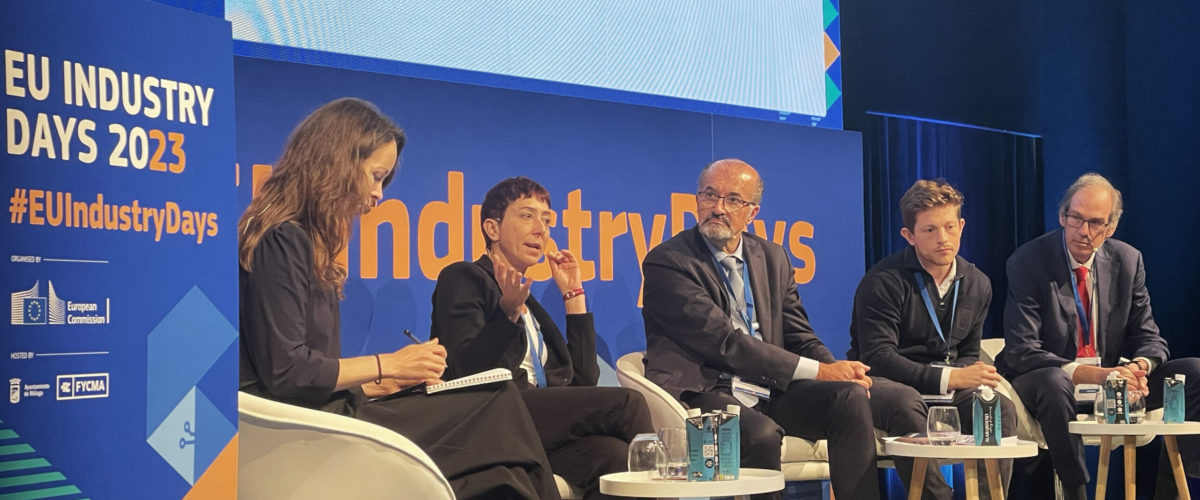Decarbonising industries with carbon capture and storage: a stakeholder session recap at the 2023 EU Industry Days in Malaga
https://zeroemissionsplatform.eu/wp-content/uploads/IMG_7470-copy-800×600.jpg
The Zero Emissions Platform (ZEP), together with the Global CCS Institute (GCSSI), hosted a stakeholder session on 5 October 2023 at the EU Industry Days – the annual gathering of industrial leaders and EU policymakers. This year’s edition was held in Malaga, providing an excellent opportunity to engage with national actors, exchange views on the current state-of-play of CCS and CCU and discuss challenges and enablers for projects deployment.
During the session, ZEP Chair Eve Tamme reiterated the incredible momentum for CCS and CCU projects in 2023 with more than 70 projects in preparation across Europe and many more in the pipeline. The take-off of these projects is increasingly supported by the European Union’s policy initiatives aimed at rapidly decarbonising industries while ensuring their competitiveness.
The EU Green Deal Industrial Plan and the proposed Net Zero Industry Act (NZIA) published this year create an unprecedented opportunity for the rapid deployment of CCS and CCU technologies. The NZIA proposal introduces an annual target of 50 million tonnes of CO2 storage capacity by 2030 – a major incentive for developing a CCS and CCU value chain.
As highlighted by the GCSSI’s General Manager of Advocacy and Communications, Guloren Turan, the EU aims to scale up CO2 storage to 300 million tonnes by 2040 and 500 million tonnes by 2050. Yet to reach these targets, time is of the essence as CCS and CCU projects take around four to seven years to become operational.
Despite ambitious objectives, industries face many challenges in scaling up CCS technologies and supporting climate efforts. For the cement industry, CCS is an essential technology to reduce emissions. More than two-thirds of CO2 emissions in the Spanish Portland cement industry derive from the calcination of limestone, rather than from fossil fuel combustion. Director General Aniceto Zaragoza Ramirez from Oficemen, the Spanish Cement Association, underscored the need for national strategies to enable the deployment of CCS projects. However, Spain currently lacks a supportive framework for CCS, creating difficult conditions for industries seeking viable alternatives to reduce emissions.
Spain holds a large potential for onshore CO2 storage capacity, with a theoretical capacity ranging from 13 to 43 gigatonnes according to a recent study by the Clean Air Task Force (CATF). Eadbhard Pernot, CATF Policy Manager for Carbon Capture, highlighted that transporting CO2 over long distances is usually more costly than storing nearby. With the majority of CO2 projected to be transported and stored in the North Sea basin, based on current project developments. This poses considerable risks for European industries not located in the region.
In South Europe, promising CCS projects like PYCASSO and Green Pulse are taking shape, exploring opportunities to connect emitting industries across borders and establishing CO2 hubs. Yet, policymakers in Member States and the EU need to act now to accelerate and ensure CO2 infrastructure access for all European industries. The proposed EU Net Zero Industry Act provides an excellent opportunity to achieve this.
To support CCS projects, ZEP has launched the Projects Network, a new initiative to gather CCS and CCU project developers from across Europe to facilitate knowledge sharing and discuss enablers and challenges of planned and ongoing projects. The network will organise two-day events in collaboration with CCS projects, with sessions focusing on the development and management of projects. The goal of the network is to provide recommendations to both national and local authorities and project developers. Sessions will address a wide variety of topics from subsurface technology, permitting, organisation, stakeholder management to business case development over the value chain.
By streamlining project development and management, project developers can expect to potentially reduce project lead times by a year, decrease both capital and operational costs by ten per cent and mitigate major risks. In the words of Stijn Santen, Co-Chair of the ZEP Projects Network “The more you prepare in the beginning of the project, the less you have to spend and repair later on in the execution phase.”
Watch the recording
